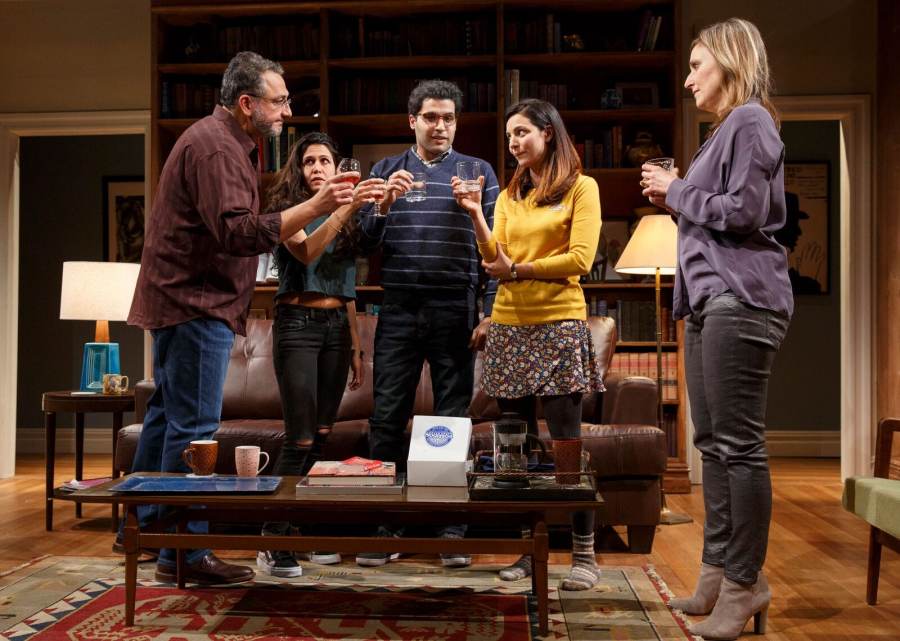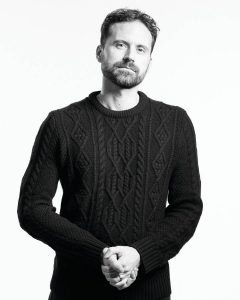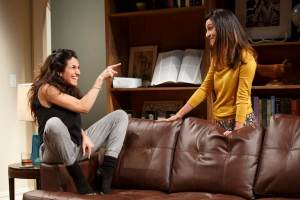

Meeting the in-laws tends to come with a fair amount of friction, and that’s never more true when religious and political opinions don’t align. That’s the focus of Zayd Dohrn’s play The Profane, currently at Playwrights Horizons, in which an engagement forces an immigrant family proud of their progressive modern views to come together with the conservative Muslim family of their future son-in-law.
In a touching exploration of faith, cultural identity, and familial disagreement on these most sensitive of topics, The Profane presents a rich and beautiful story grounded in real and moving characters. Dohrn walked us through the many complex conversations he joins in this new play.
What inspired you to tell this story?
Like most of my plays, it came out of a combination between personal experience and a political thought I was having, or something I was seeing in the world. The political experience was that I wrote it shortly after the Charlie Hebdo shootings in Paris, and the literary community was debating the question of free speech versus religious expression. Is it okay to defend a newspaper that had been publishing these very provocative, and in some cases sacrilegious, cartoons about Islam? Nobody was defending the violence, but there was this question of can liberal artistic humanism coexist with devout religious Islam? And meanwhile, in America, there was this pastor in Florida who was burning the Qur’an, and there was the debate in New York over the 9/11 mosque. All this stuff was happening that had to do with how western liberal cosmopolitanism can integrate with religious Islam.
I was thinking about that in sort of an abstract way, and then I found several stories in family and close friends with religious Muslims marrying into families that were more secular. I started to think there was something really interesting about people who think they can be tolerant of anything, but can sometimes not be as tolerant of something that comes from their own background. That’s how I was thinking of it, and the play sort of grew out of that weird conversation.

I tried to imagine what was a religion that I had, and books occurred to me as a way that I discovered myself, understood the world, thought about people who weren’t like me, and joined a community. I always thought of the play as this collision between two worldviews, both of which were about texts and community. In the religious sense, this was about the holy books and the community of believers. I feel strongly that there’s another community, a secular faith in literature and in art, and that that’s its own community. That’s why the title is what it is. I was always interested in this idea that there are sacred texts and profane texts, but profane texts can be a source of faith for people, or a source of comfort for people.
You deal a lot with questions of faith, and the process of finding or leaving religion. How did you decide your approach to that issue, and what are you hoping audiences take away from it?
We talked a lot about that in the rehearsal room. To me it was always about the process of it. One of the things I learned early on as a playwright is that characters are only interesting and only real if they’re in movement, if they’re changing and moving towards something. I’ve always thought of this play as not about some people who believe and some people who don’t believe, but that everybody in the play is moving along the spectrum of belief in one direction or another. The daughter discovers a faith she didn’t have as a kid, and her boyfriend is questioning a faith he grew up with, but the other characters are all in that process of either gaining or losing their faith. There’s this other story that I wanted to explore that I don’t think has gotten as much attention, of people who come from modern, secular families and the families think that they’ve made progress and left their faith behind, and then their kids rediscover that faith. That’s a weird, interesting process – that progress doesn’t go in one direction, that people can move in multiple ways as they grow and move about the world.
Many of your characters are immigrants, but they all have different relationships to their home countries and cultures they grew up in. What inspired you to speak about the immigrant experience in that way, and how did you define those relationships?
For me, I wrote the play before the election, but I was thinking at the time of what it means to be American. The story of our country is a story of immigrants, and people coming here and assimilating and becoming part of the culture. Of course, it’s also a story of backlash against that assimilation. I wanted to write something about that idea of what it means to be American, and that most of us come from a line of immigrants, and yet there’s this weird amnesia about it. For me, the play was partly about that sense of one family who’s been here longer and assimilated more thoroughly, confronting another family that might be on the same path that they were on but is at a different moment in that journey, and the misunderstandings that can arise.

I always thought it would be interesting to see the same actress play these two women who are so different. I guess my hope was that it would make the audience think about how much of who we are is contingent on how we’re raised and who we grow up with and where we come from. The metaphor of the double casting is that they’re literally the same person, but they’re totally different. I was hoping to make people think about ourselves, and how different we might be if we were new to this country. It’s not inborn, it’s created and cultural. Not just with the double casting, it’s also with the two sets, to see the one house and the other house, to see the parallels between them and the differences. There’s a holy book in each house and there are rugs in each house. Maybe surprisingly, the more assimilated family has Persian rugs in their house and the other family has more modern rugs. I was thinking about how the spaces we live in say something about who we are.